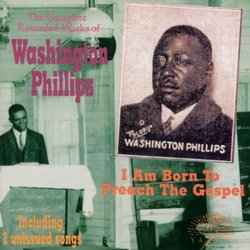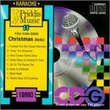| All Artists: Washington Phillips Title: I Am Born to Preach the Gospel Members Wishing: 2 Total Copies: 0 Label: Yazoo Release Date: 5/1/1992 Genres: Country, Blues, Pop, Christian & Gospel, Gospel Styles: Classic Country, Traditional Blues, Vocal Pop, Traditional Number of Discs: 1 SwapaCD Credits: 1 UPCs: 016351020321, 016351020345 |
Search - Washington Phillips :: I Am Born to Preach the Gospel
 | Washington Phillips I Am Born to Preach the Gospel Genres: Country, Blues, Pop, Christian & Gospel, Gospel
Texas-born singer Washington Phillips did a limited amount of recording between his first sessions in 1927 and his last, which were completed in 1939. What little recording the unique solo gospel performer did can be found... more » |
Larger Image |
CD DetailsSynopsis
Amazon.com Texas-born singer Washington Phillips did a limited amount of recording between his first sessions in 1927 and his last, which were completed in 1939. What little recording the unique solo gospel performer did can be found on this wondrous 16-track collection. Accompanying himself and singing with gentle resolve, Phillips created serene music that really did feel touched by grace. (Until recently, it was thought that Phillips played a rare autoharplike instrument called a dolceola. But Austin American-Statesman writer Michael Corcoran's research points to a zither as the probable source of the celestial sound on these recordings. Corcoran also found that Phillips didn't die in 1938, as was generally believed, but lived until 1954.) Early in his career, Ry Cooder revived a couple of Phillips's best numbers ("Denomination Blues" and "Tattler"), but the singer is largely a forgotten figure these days. I Am Born to Preach the Gospel makes that seem like an unpardonable sin. --Steven Stolder Similar CDs
|
CD ReviewsFar More than a Novelty Dolceola Act 04/21/2002 (5 out of 5 stars) "A beautiful album in the way that early folk art is beautiful --spare and simplistically powerful. It ranks alongside Blind Willie Johnson's work as the most heartfelt and relevant early gospel/blues recordings on the market. A question that begs to be answered is whether or not the novelty value of the dolceola propels these recordings toward a unwarranted degree of reverence in the gospel/blues genre. I've attempted to transcribe some of these works (the original Phillips works only) for guitar and while they I'm convinced that the dolceola is central to the delivery of the material on this album, the music and the messages translate surprisingly well to other instruments. See Ry Cooder's version of Denomibation Blues" The sound of simple truth nadav haber | jerusalem Israel | 12/19/2001 (5 out of 5 stars) "Washington Phillips sang and played with the utmost skill. His music was simple and his message was clear, no one ever sounded like him, and no one ever will. This CD is one of relatively few who feature the guitar evangalists, most famous of which is Blind Willie Johnson, and which also include Blind Joe Taggart, Blind Roosevelt Graves, Rev. Gary Davis and others. Those are all exceptional musicians, making the music that expresses the life of the society they were part of. Phillips plays the dolceola, a strange instrument that produces angelic sounds when played by him. This is enough to make him sound original. But the originality is in the man himself, and not in the instrument he uses. Phillips has to be one of the most sincere sounding artists ever recorded. His sincerity was spectacular even for his time, and today it is unheard of. He does not have the emotional raw power that Blind Willie Johnson posessed, but in his mellow way he may be just as effective. I cannot think of any serious music lover who should not listen and enjoy this music." Truly outstanding WPFan | WPCentral | 03/17/2004 (5 out of 5 stars) "This man was an amazing performer! His music is pure, raw, powerful, and beautiful, all at once. His lyrics span from heart-wrenching to openly and hilariously judgmental. The one that raises the hair on the back of my neck is "Key to the Kingdom", a dreamstate performance featuring an almost chant-like vocal rendition. His instrument sprinkles single notes, some fat and plunky, some high and sparkling, over the foundation of a grinding, relentless drone. The total generates a half-real atmosphere. But then, there isn't anything weak on the whole CD.Incidentally, it appears that Phillips's instrument was in fact two zithers, joined together to make one big one. This information is from:http://www.angelfire.com/country/fiddlin/clips.html#wpAt this site, the instrument Phillips is pictured holding in the photo on the back cover of the CD is investigated and approximated, successfully in my opinion. The Dolceola is also investigated, and this site offers comparative sound clips of both instruments. (This is a non-commercial public service-type site that offers nothing for sale.)Of course for any of this to mean anything you will need to buy the Phillips CD, which you need to do anyway if you haven't yet. You've never heard anything like it, guaranteed."
|

 Track Listings (16) - Disc #1
Track Listings (16) - Disc #1
